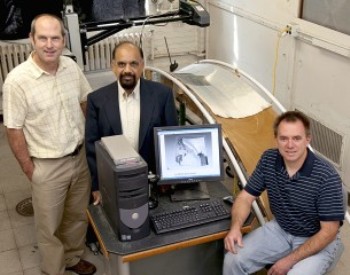Laser equipment installed at the Wind Energy Manufacturing Laboratory of Iowa State University is designed to scan each stratum of the flexible fiberglass fabric utilized in the manufacture of wind turbine blades.
 Iowa State engineers, left to right, John Jackman, Vinay Dayal and Frank Peters use the Wind Energy Manufacturing Laboratory to find better ways to make components for wind turbines.
Iowa State engineers, left to right, John Jackman, Vinay Dayal and Frank Peters use the Wind Energy Manufacturing Laboratory to find better ways to make components for wind turbines.
A computer designed for the purpose will analyze and calculate the fit and flow of layers on the curves of the blade mold and find out any wave or fold in the fabric or any other defect present in the 40 m length wind turbine blade as that may harm the turbine if allowed to go unchecked.
The wind lab, which was constructed as a part of $6.3 million, 3 year research project is now in operational for more than a year. The research is a joint effort of scientists from Scottsdale, Arizona-based TPI Composites, which owns and manages a wind turbine manufacturing facility in Newton and Albuquerque, N.M.-located Sandia National Laboratories of the U.S. Department of Energy. The researchers are focused to formulate novel low-cost production arrangements to improve the production in wind turbine manufacturing facilities by 35%.
The research lab located at Sweeney Hall at the University provides the scientists with equipment and facilities to research the ways the lasers scrutinize the fiberglass fabric utilized in the production of wind turbine blades, to formulate a technology to assess the blades without causing damage, to study and improve the edges of wind blades, to introduce accurate 3-D laser measurements for wind turbine blades measuring 40 m and to formulate novel fabric treatment know-how for computerized blade construction.
The researchers involved in the study include Vinay Dayal, associate professor of aerospace engineering at Iowa State University, John Jackman, industrial and manufacturing systems engineering’s associate professor, and Matt Frank and Frank Peters associate professors of industrial and manufacturing systems engineering at the University. The faculty researchers were assisted by graduate students from aerospace engineering and industrial and manufacturing systems engineering. The lab received finance from Iowa Office of Energy Independence, the U.S. Department of Energy and TPI. The lab partners in the research include Center for Industrial Research and Service of Iowa State and the Iowa Alliance for Wind Innovation and Novel Development.